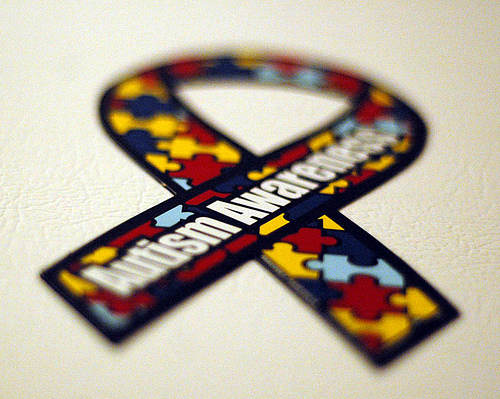I am participating in the Health Activist Writers Month Challenge, in which I publish a post every day for the month of April, based on health-related prompts.
April 27 – 5 challenges, 5 small victories: Make a list of the 5 most difficult parts of your health focus. Make another top 5 list for the little, good things (small victories) that keep you going.
Autism can be a very complicated thing to live with. Its manifestations change from day to day. One day, my son will be able to tolerate loud noises but a small change in routine will send him into meltdown. The next, we’ll be able to turn his entire routine upside down but anything louder than a whisper will set him off. Different strategies work for different kids on different days, and everyone you might see guidance from is convinced that their opinion is the right one.
The things I find most challenging about being an autism mom don’t really have to do with the autism itself. Whatever might be going on with my child on any particular day, I just deal with it. Sometimes it’s hard, but I always know that I’m doing my best, my son is doing his best, and at the end of the day we’ll all survive.
My challenges tend to come from sources other than my son and his autism. I list them in no particular order.
- The judgmental critics. It’s a moment every autism parent has lived through at least once. You and your child are in a grocery store, which let’s face it, is a mecca for sensory overload, and your child is getting more agitated by the second. You throw things into your cart at quickly as you can, but just as you get to the checkout, your child reaches his breaking point and explodes. As you are trying to calm him down, some snarky stranger loudly proclaims, “What that child needs is a good hiding.” I once heard someone say (referring to me), “If that mother was doing her job properly, this wouldn’t be happening.” Like I’m not already carrying around enough angst with me. With my social anxiety, I’m not great at the quick comeback, although I’m definitely better than I used to be.
- The third-person talker. These are the people who will talk about someone who is present as if that person were not in the room. The chances of this happening increase exponentially if the subject of conversation happens to have autism. I get it all the time. “Would George like a hamburger?” they will ask. My answer always seems to throw them a little: “Ask him,” I say. Yes, it is true that George is not the world’s greatest talker, and may not respond to everything that is said to him. But, you know. At least give the kid a chance to try. If he struggles to answer, I will help him.
- Guilt. I was educated at a girls-only Catholic school run by nuns, and I am married to an Irish Catholic man. I can therefore say with some authority that the Catholics turn guilt into an art form. And some of the guilt that I feel as a special needs parent (hell, forget special needs – just as a plain old parent) almost makes me think I should just convert. I feel guilty about everything. Did the Taco Bell I ate during pregnancy cause George’s autism? Did I give him enough affection as a baby? Am I paying enough attention to my other son? Did I get too mad at George when he tipped over the laundry basket? The list goes on and on, and my guilt makes me constantly second-guess myself when I should just be following my parental instincts.
- Time. Time very often seems to be my enemy, so much so that I sometimes regard it as a person. Time with a capital T. No matter how much I try, Time seems to run away from me. At the end of each day, there is always something that remains undone. Parenting is my absolute number 1 priority, so my kids’ needs are always taken care of. But I tend to let other areas of my life slip occasionally, and that is detrimental to my physical and mental health.
- The Internet. When George was diagnosed with autism five years ago, the first thing I did when I got home was Google autism. I obsessively read web page after web page. Every link that I clicked on seemed to have some information that flatly contradicted something I’d read somewhere else, and in the end my brain was hurting from information overload. I was overwhelmed by not knowing what information to trust. Since then, I am wiser in my use of the Internet and I have learned, for the most part, how to tell the good information from the noise. But the Internet, with all of its gazillion theories about the causes of autism, can still hinder more than it helps a lot of the time.
In my house, there is no such thing as a “small victory”. Every single accomplishment, all of the positive things in our lives – are massive, big things. That’s the way it often is in special needs families. We tend to place extra stock in things that other families take for granted. And as hard as it can be to live with autism, there are many things that I am grateful for, that enable me to keep chugging along even at times when I just want to cry.
- Love. Love really does make the world go around. Out of all the challenges my son has, lack of affection is definitely not one of them. Both of my sons give the best hugs that I can carry around with me all day. My favourite moments are when my boys somehow manage to squeeze onto my lap together to give me a hug. I sit there, with my arms full of squirmy, giggling kid, and never want the moment to end.
- Running. Yes, running keeps me sane, and when something stops me from doing it – like illness or injury – depression starts to creep in. The fact that it keeps me in good physical health is almost a by-product of running. My prime reason for doing it, along with raising funds for autism, is to keep my mental health on an even keel. I struggle with mental illnesses like depression and anxiety, and there’s no better way to combat my darker moments than a good long run. I am stubbornly resistant to using medication to deal with my issues, and running acts as a decent substitute for chemicals most of the time.
- Therapy. It has been said that running is cheaper than therapy, and while that is certainly true, I actually do need both. The therapist/client relationship is a very strange one. It involves the client placing complete trust in someone they actually know nothing about. I have been going to my therapist for a little over a year now, and it has taken me almost all of this time to build up my trust to a level where I can really open up during my sessions. Sometimes the sessions are very hard and they make me feel all weirded out for a while, but the truth is that once a week, I get the opportunity to talk without reservation in the sanctuary of my therapist’s office. I can say whatever I like and there will be no judgment or anger.
- Writing. I am somewhat inept as a verbal communicator, and I experience high levels of anxiety in social situations. When I am talking to other people, I hold back a lot, not only because of my natural shyness, but because my brain actually doesn’t work well during conversation. I can formulate a completely coherent thought in my mind, and even mentally phrase how I want to say it, but when it comes time for me to speak, my words get lost somewhere between my brain and my mouth. With writing, that doesn’t happen. I truly have a voice, and I treasure the opportunities to speak my mind on things that are important to me.
- The Internet. The Internet is both a blessing and a curse. Despite the evils described in my “bad” list, the Internet is a haven of sorts. I belong to two Internet support groups – one for moms who have suffered pregnancy or infant loss, and one for parents of children with autism. Both of these groups are places where I can vent my concerns, ask for advice, or celebrate good news. Some of my best friends are people who I have known online for a long time, but have never met in person. Here’s the wonderful thing about the Internet: no matter what I am going through on any particular day, I will always be able to find someone who knows, at least to some extent, how I feel.











